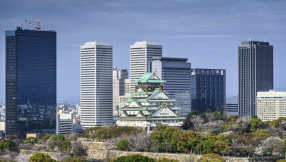Evangelical churches are booming in traditionally Catholic Brazil, particularly among the country's most deprived communities.
In Brazil's favelas, low-income slum settlements lacking access to resources such as healthcare, sanitation, transportation and property registration, the Church has become a vital support.
'The government doesn't help us so God is the only option for the poor,' Pastor Antonio, 37, told the Thomson Reuters Foundation.
Antonio, like many poor young men, was raised in the favela and drawn to the drug trade before finding God and becoming a minister. He says the Church provides hope and support for deprived Brazilians who have little else in their lives.
'There are a lot of problems here in the favela. Poverty, a lack of work, crime, mental health issues - the church helps with these things.'
Evangelical churches are growing, experts say, in part because they provide essential services such as education, security and economic development.
Evangelicals make up much of Brazil's more-than-20 per cent Protestant community, according to the Pew Research Centre. Overall Brazil has a population of about 200 million. In 1949, the Protestant community was only three per cent of the country.
In favela communities, the evangelical communities are larger, sometimes about 50 per cent, according to Jeff Garmany, a lecturer at King's College London's Brazil Institute.
In Cantagalo, one of three favelas in southern Rio de Janeiro, with a population of about 30,000, there are two Catholic churches and over 15 evangelical churches, according to Antonio.
'People in favelas are dealing with serious issues of stigma, poverty and violence,' Garmany said.
'The state's inability to adequately deal with these issues allowed the churches to grow and make inroads with people.'
About 20 per cent of Brazil's big city residents make their home in informal favelas, making conservative evangelicalism an increasingly significant force in society.
Senator Marcelo Crivella, an evangelical mega-church bishop, was elected mayor of Rio de Janeiro last year, with a significant vote from working class communities.
Garmany added: 'The evangelical churches aren't just providing religious services in the favelas, they're addressing social issues people are dealing with head-on.'
One worshipper at a service at a charismatic Assemblies of God service in Cantaglo had a simple explanation for the church growth.
'What the world can't provide us, the church provides,' she said.
'The church gives me things the physical world cannot offer.'













